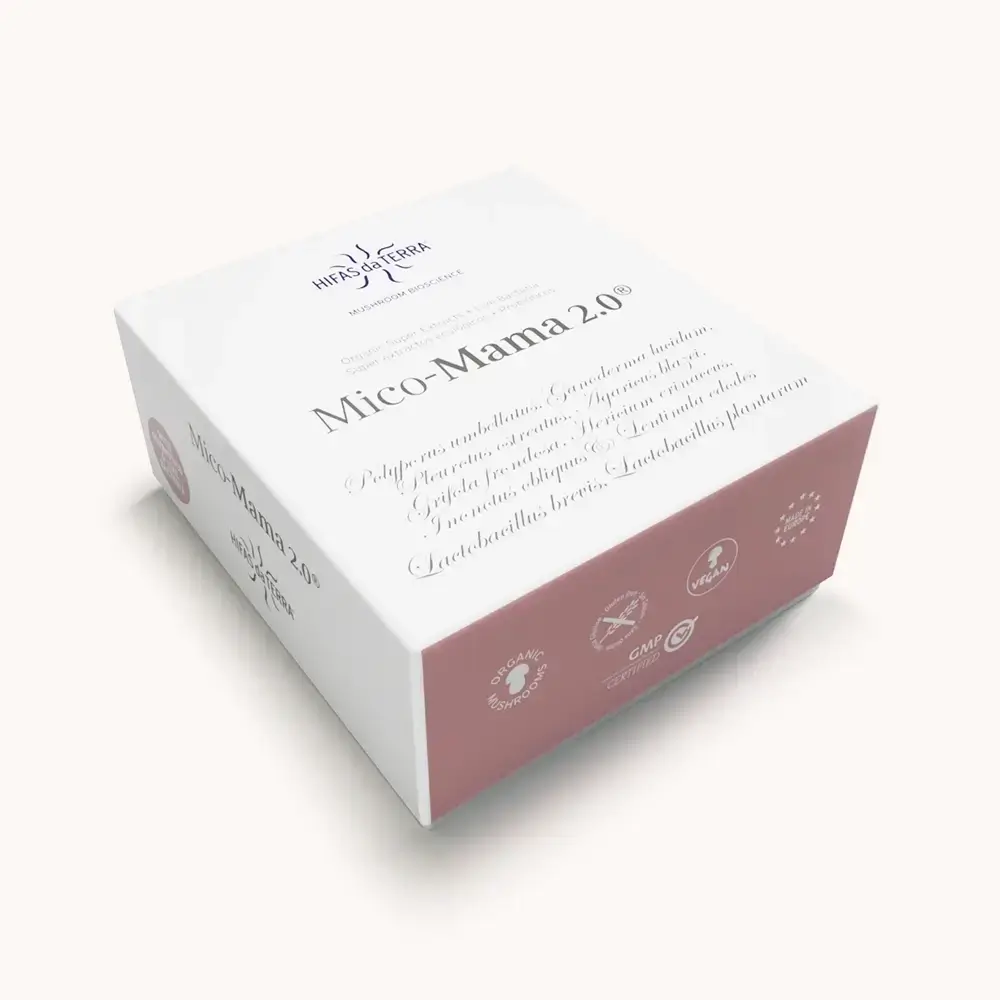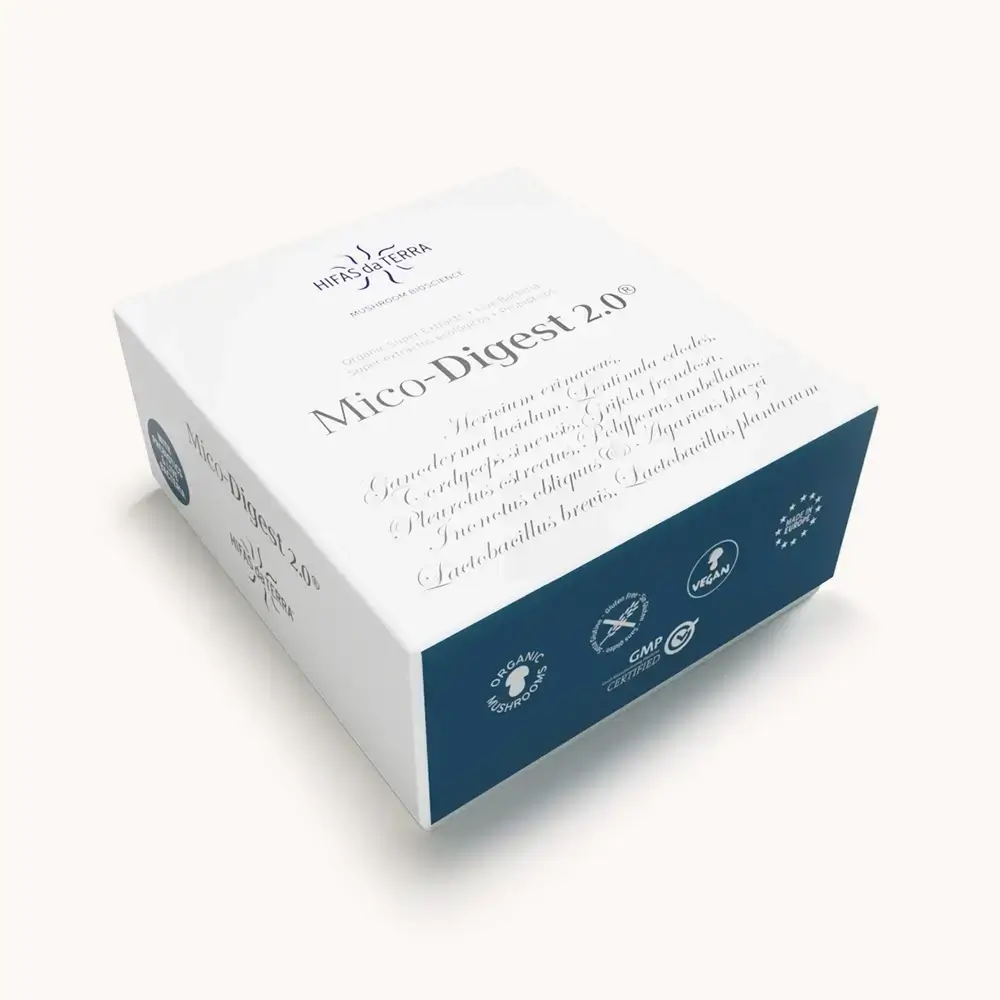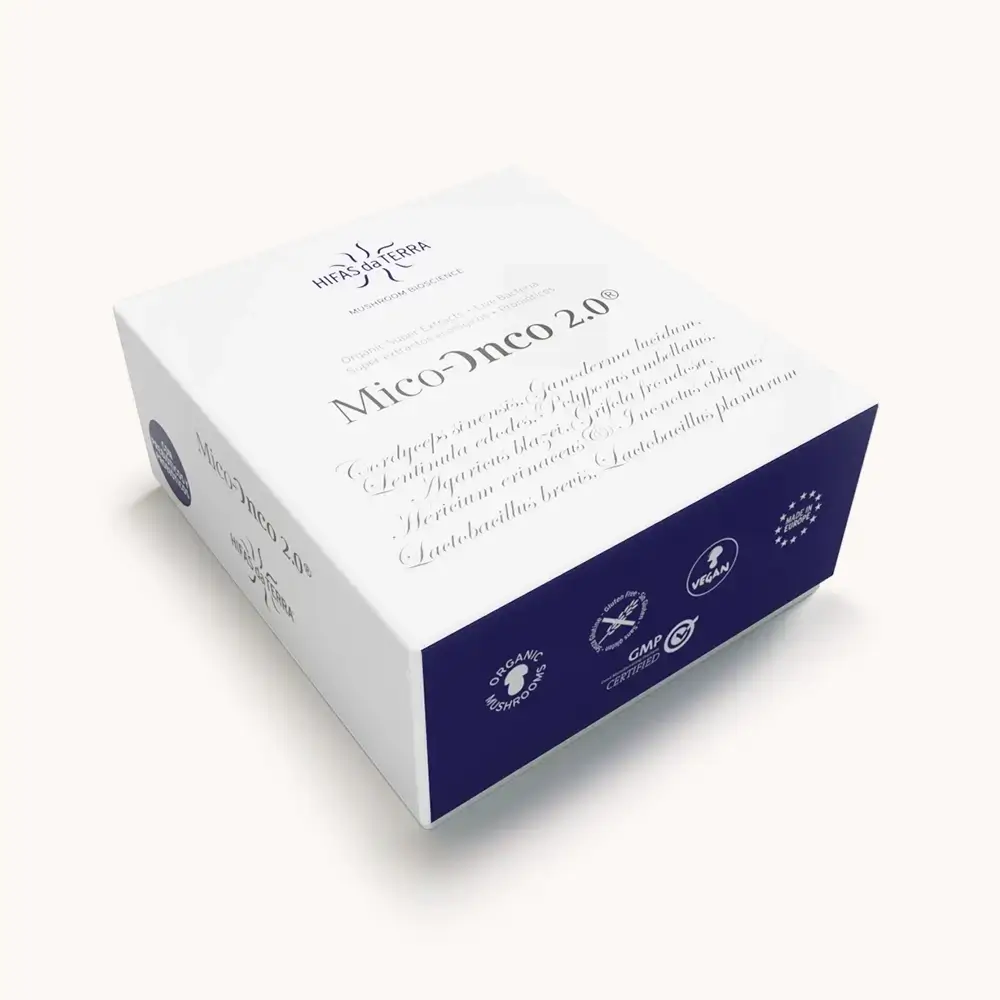Shiitake (Lentinula edodes) is an edible medicinal mushroom which is widely used in gastronomy. Its content of bioactive substances such as phenolic compounds, immunomodulators, among many others, make it also of great interest in healthcare. The name Shiitake is derived from the Japanese word ‘Shii’ indicating a variety of tree similar to the chestnut tree (Castanopsis cuspidata), and from the word ‘take’ meaning ‘mushroom’. It has been documented as one of the first mushrooms to be produced on wood and is now one of the most widely consumed mushrooms in the world. It is considered a natural aphrodisiac and is also known by the names ‘Himematsutake’ and ‘Xianggu’ or ‘Hoang-mo’.
ESSENTIAL NOTES ON THE ‘FOREST FUNGUS’
Like Reishi or Maitake, this species has a long tradition of use in traditional medicines and its properties and actions have been written about in many publications in scientific portals. There have been studies carried out describing the compounds and actions of this mushroom by medical institutions such as the New York Academy of Science and Universities in Japan, China, the United States, the United Kingdom, Germany, Sweden, and more. Some of the results of this research have been published in The Journal of Cancer and Chemotherapy, International Journal of Immunotherapy, International Journal of Immunopharmacology, among others. These areas of interest currently stand out:
- Metabolic-endocrine system: studies on blood pressure, cholesterol, overweight and obesity.
- Integrative support: promising studies on shiitake’s actions in combination with conventional treatments and its effect on quality of life. It is also being studied as an adjuvant due to its polysaccharide content.
Shiitake is an edible mushroom, highly prized in China and Japan. Moreover, its therapeutic qualities have been valued since time immemorial in Eastern cultures. It is both high in nutritional value as it contains all the essential amino acids and stands out for its iron, calcium and zinc content, B vitamins, vitamin E and provitamin D, polyunsaturated fatty acids as well as significant levels of polysaccharides, particularly the beta-glucan lentinan. This polysaccharide, like PSK, has been used in Japan for cancer treatment since the 1980s.

PROPERTIES, USES AND APPLICATIONS OF SHIITAKE
In Traditional Chinese Medicine (TCM) shiitake is considered a food that enhances the ‘Jing-Qi’, the ‘vital energy’ and the ‘Xie-Qi’ system of ‘resistance to external pathogens’. This explains its use in diseases related to ‘excess cold’.
The medicinal mushroom L. edodes stands out for its organoleptic and nutritional qualities. Some studies have found that it contains a high protein content, is low in fat and provides essential amino acids. Current science has validated many of this mushroom’s traditional medicine uses. It has been found to contain both macro and micronutrients of interest, such as polysaccharides, antioxidants, dietary fibre, ergosterol, vitamins (B1, B2 and C), folates, riboflavin, niacin, iron and various minerals.
Which form offers the highest concentration of active compounds found in Shiitake? The highest concentration of Shiitake’s active ingredients can be found in a standardised organic extract (Mico-Shii), ideally obtained using green and sustainable technologies, which concentrate its active biomolecules intact, both from the cap and stem, for a better use of its compounds. Another good option is galenic extracts in liquid form (Dr. Immune Five), which makes it possible to titrate the dosage to achieve the optimum results for the specific needs of the user, tailored to their body weight.
The use of extract combinations is also common in nutraceuticals for broader spectrum synergistic results. Shiitake is combined with Reishi and Maitake (Mico-Mix) for optimum metabolic balancing effects, or with Reishi, Maitake, Sun Mushroom, Cordyceps and Chaga (Mico-Five) for broad spectrum immune support.
An intermediate option between taking Shiitake grilled or in risotto and taking an extract in capsule or liquid form – which would even have a more appropriate preventive functional value – would be from 100% micronised Shiitake powder (Bio-Shii), or combined with other species to achieve certain actions on the immune system (Bio-Defense) and on digestive well-being (Bio-Intestin).
PROPERTIES, USES AND APPLICATIONS OF SHIITAKE
In Traditional Chinese Medicine (TCM) shiitake is considered a food that enhances the ‘Jing-Qi’, the ‘vital energy’ and the ‘Xie-Qi’ system of ‘resistance to external pathogens’. This explains its use in diseases related to ‘excess cold’.
The medicinal mushroom L. edodes stands out for its organoleptic and nutritional qualities. Some studies have found that it contains a high protein content, is low in fat and provides essential amino acids. Current science has validated many of this mushroom’s traditional medicine uses. It has been found to contain both macro and micronutrients of interest, such as polysaccharides, antioxidants, dietary fibre, ergosterol, vitamins (B1, B2 and C), folates, riboflavin, niacin, iron and various minerals.
Which form offers the highest concentration of active compounds found in Shiitake? The highest concentration of Shiitake’s active ingredients can be found in a standardised organic extract (Mico-Shii), ideally obtained using green and sustainable technologies, which concentrate its active biomolecules intact, both from the cap and stem, for a better use of its compounds. Another good option is galenic extracts in liquid form (Dr. Immune Five), which makes it possible to titrate the dosage to achieve the optimum results for the specific needs of the user, tailored to their body weight.
The use of extract combinations is also common in nutraceuticals for broader spectrum synergistic results. Shiitake is combined with Reishi and Maitake (Mico-Mix) for optimum metabolic balancing effects, or with Reishi, Maitake, Sun Mushroom, Cordyceps and Chaga (Mico-Five) for broad spectrum immune support.
An intermediate option between taking Shiitake grilled or in risotto and taking an extract in capsule or liquid form – which would even have a more appropriate preventive functional value – would be from 100% micronised Shiitake powder (Bio-Shii), or combined with other species to achieve certain actions on the immune system (Bio-Defense) and on digestive well-being (Bio-Intestin).
PRODUCTS WITH SHIITAKE
£262.00
£262.00
£250.00
£64.90
£228.00
FEATURED NUTRIENTS
ERGOSTEROL:
vitamin D precursor
VITAMINS:
B1, B12 and E
ERYTHADENINE
MINERALS:
Zinc
Iron
Calcium
HABITAT AND DISTRIBUTION
The cultivation of shiitake, a medicinal mushroom of Asian origin, is one of the most widespread. Originally it was cultivated exclusively in Eastern countries, but nowadays large scale production is carried out both in Europe and in the USA, where it is in great demand.
The shiitake industry in Japan is continuously expanding and enjoys a good reputation for its contribution to forest conservation.
MYCOLOGICAL NOTES
Lentinula edodes (Berkeley) Pegler belongs to the order Polyporales, family Polyporaceae, genus Lentinula. L. edodes is the most important species of this genus, which was introduced into production by Pegler in 1975.
The scientific name L. edodes is composed of three words: lent (flexuous), inus (resembling) and edodes (edible).
Shiitake is also known as Forest Mushroom and Black Forest Mushroom. In China it is popularly known as Shaingugu (pin yin = Shang Guor Shiang-ku) which means scented mushroom or also Hua Gu or Qua Gu which means white flower mushroom, the name given to the white variety of shiitake called Donko.
This species has 5 to 25 cm diameter caps with irregular edges. Its laminae are white with reddish tones that also darken with age. The hairy cuticle of the cap is dark brown in colour and has concentric ring formations of different shades that allow the differentiation of the commercial varieties of this mushroom. The stem is fibrous and centred.
SHIITAKE CULTIVATION
Shiitake grows in clusters on the decaying wood of deciduous trees such as chestnut, oak, maple, beech, poplar, mulberry and others. Its natural distribution includes warm, humid climates.
In nature, Shiitake spreads by spores, but in cultivation, this reproductive method is not the best way to produce large quantities. We use the common cultivation technique of pellets inoculated with shiitake spores used to colonise wooden logs, which are checked to ensure they are free of mould and pathogenic bacteria, with shiitake mycelium.
Highest quality, purity and perfomance in our production systems
Through our own quality standards, we identify biomolecules and active ingredients with therapeutic actions, selecting the fungal strains that contain the optimum amounts, and use our own specific analytical systems to apply analysis protocols at different stages of production. Thanks to this rigorous system, we offer natural products, supplements and nutraceuticals with the Hifas Quality System guarantee, setting us apart from other products in terms of quality, safety and efficacy.

Highest quality, purity and performance in our production systems.
Through our own quality standards, we identify biomolecules and active ingredients with therapeutic actions, selecting the fungal strains that contain the optimum amounts, and use our own specific analytical systems to apply analysis protocols at different stages of production. Thanks to this rigorous system, we offer natural products, supplements and nutraceuticals with the Hifas Quality System guarantee, setting us apart from other products in terms of quality, safety and efficacy.
R&D AND STUDIES WITH SHIITAKE
- Hifas da Terra’s R&D team recently published an article on the hydrolysis method used to extract the antioxidants from shiitake. It was concluded that this is a sustainable organic process for the selective solubilisation of phenolic compounds found in shiitake with antioxidant properties.
FUN FACTS
- Medicinal use of shiitake became widespread during the Ming dynasty (1368-1644) in China, following the development of methods for its cultivation on tree trunks.
- According to popular legend, 5,000 years ago, a deity named Shennong endowed the world with shiitake and all other medicinal mushrooms. Tree trunks were inoculated with shiitake spores when a child was born. The child and the mushrooms would mature together until adulthood. As an adult, the child would have the opportunity to inherit the fortune of shiitake production.
- Fukushima M, Ohashi T, Fujiwara Y, Sonoyama K, Nakano M. Cholesterol-lowering effects of maitake (Grifola frondosa) fiber, Shiitake (Lentinus edodes) fiber, and enokitake (Flammulina velutipes) fiber in rats. Exp Biol Med (Maywood). 2001 Sep;226(8):758-65.
- Xu X, Yan H, Zhang X. Structure and immuno-stimulating activities of a new heteropolysaccharide from Lentinula edodes. J Agric Food Chem. 2012 Nov 21; 60(46):11560-6. Epub 2012 Nov 12.
- Ina K, Furuta R, Kataoka T, Kayukawa S, Yoshida T, Miwa T, Yamamura Y, Takeuchi Y. Lentinan prolonged survival in patients with gastric cancer receiving S-1-based chemotherapy. World J Clin Oncol. 2011 2(10):339-43.
- Okuno K, Uno K. Efficacy of orally administered Lentinula edodes mycelia extract for advanced gastrointestinal cancer patients undergoing cancer chemotherapy: a pilot study. Asian Pac J Cancer Prev. 2011 12(7):1671-4.
- Kabir Y, Yamaguchi M, Kimura S. Effect of shiitake (Lentinus edodes) and Maitake (Grifola frondosa) mushrooms on blood pressure and plasma lipids of spontaneously hypertensive rats. J Nutr Sci Vitaminol (Tokyo). 1987 Oct;33(5):341-6.
- Otsuka M, Shinozuka K, Hirata G, Kunitomo M. [Influences of a shiitake (Lentinus edodes)-fructo-oligosaccharide mixture (SK-204) on experimental pulmonary thrombosis in rats]. [Article in Japanese] Yakugaku Zasshi. 1996 Feb;116(2):169-73.
- Yagi K. Liver protective effect of Lentinula edodes mycelia (LEM). Gan To Kagaku Ryoho. 2012 Jul;39(7):1099-102.
- Sun J, Wang H, Ng TB. Isolation of a laccase with HIV-1 reverse transcriptase inhibitory activity from fresh fruiting bodies of the Lentinus edodes (Shiitake mushroom). Indian J Biochem Biophys. 2011 Apr;48(2):88-94.
- Shouji N, Takada K, Fukushima K, Hirasawa M. Anticaries effect of a component from Shiitake (an edible mushroom). Caries Res. 2000 Jan-Feb;34(1):94-8.
- Del Buono A et al. (2016) Polysaccharide from Lentinus edodes for integrative cancer treatment: immunomodulatory effects on lymphocyte population. World Cancer Research Journal 3, e652.
- Gu J et al. (2015) Lentinan plays synergistic effects in paclitaxel-induced A549 cell apoptosis via activating ROS-TXNIP-NLRP3 signal. Journal of Cellular and Molecular Medicine 19, 1949-1955.
- Omar Alejandro Rivera et al. (2017) Bioactive components of Shiitake and its impact on health. AVFT, volumen 36, número 3, 2017.
Shiitake
Lentinula edodes
HIMEMATSUTAKE
Xianggu or Hoang-mo








